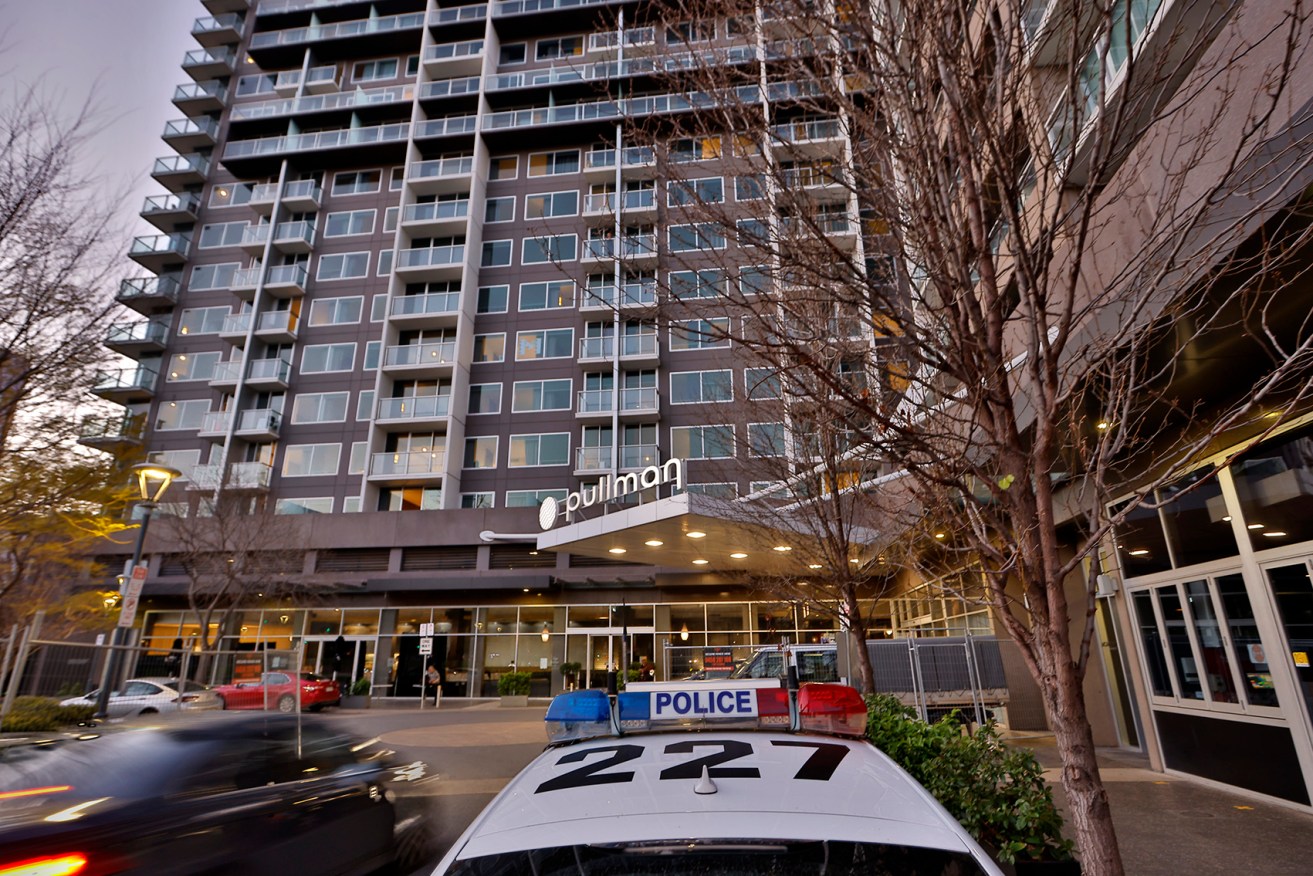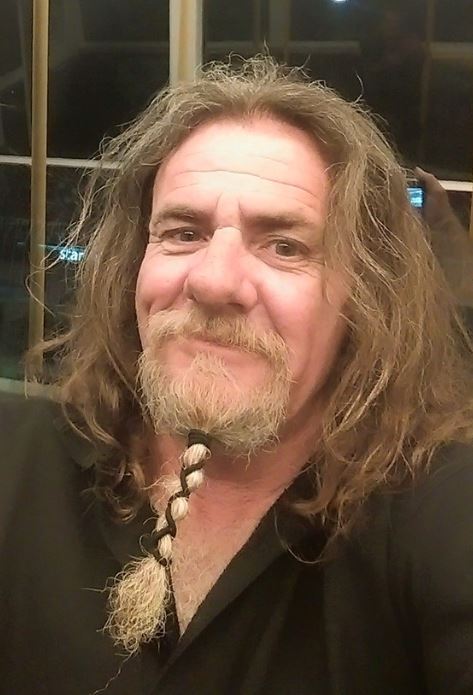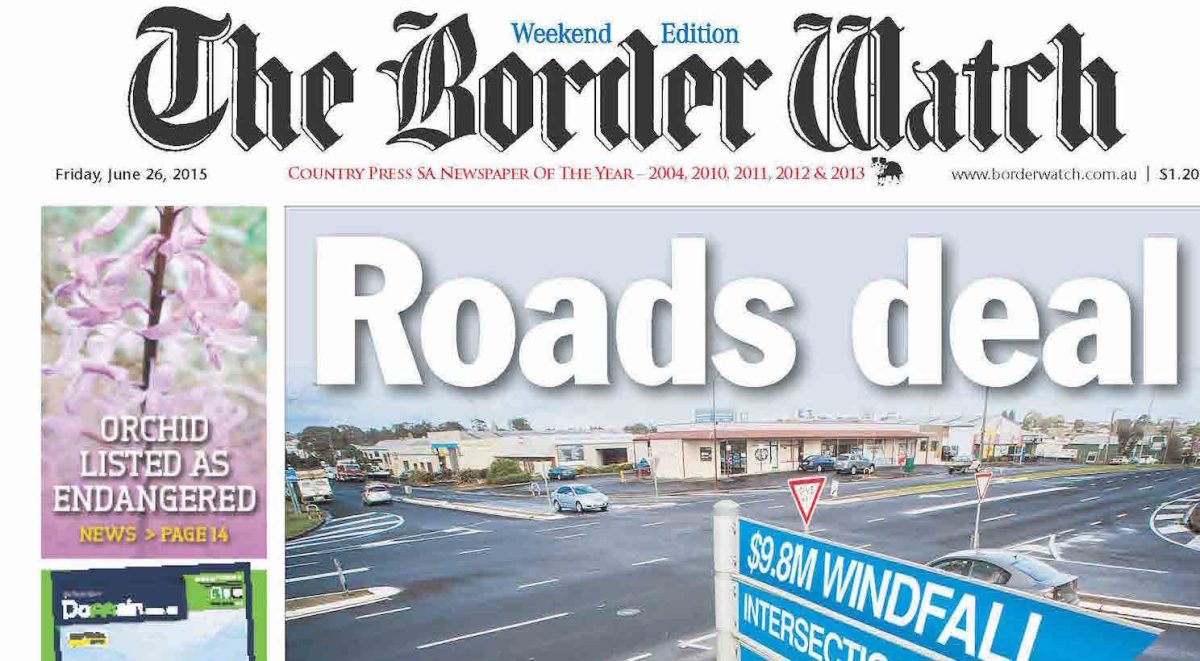What we know today, Thursday September 24
Welcome to your serving of the day’s breaking news from South Australia, the nation and abroad. Follow this post for live updates through the day.


The Pullman medi-hotel in Hindmarsh Square. Picture: Tony Lewis/InDaily
- Premier takes charge of footy finals exemption error probe
- Search for missing boatie resumes
- Mount Gambier newspaper to be resurrected
- NSW border opens with message of vigilance
- Falling case numbers could see early easing of Melbourne restrictions
- State parliament passes COVID-19 Emergency Act extension
- Westpac fined $1.3b for laundering breach
Time running out in race to save Tassie whales - Insolvency lifeline for struggling small businesses
- Unrest over Breonna Taylor indictment verdict
- New UK virus rules under fire
Premier takes charge of footy finals exemption error probe
The Premier’s Department will conduct an inquiry into a “frustrating” SA Health decision to allow Victorian relatives of Port Adelaide Football Club players into the state, amid revelations that a senior public servant with Port connections acted as a “middle person” for the families.
Premier Steven Marshall and SA chief public health officer Professor Nicola Spurrier said this morning that the independent inquiry would be led by the Premier’s department, with the results to be made public.
It follows revelations yesterday afternoon that a SA Health worker inappropriately granted 11 relatives of Port Adelaide Football Club players special exemptions to come to South Australia from Victoria to watch Port’s upcoming two finals games at Adelaide Oval.
Since then, it has emerged that SA Tourism Commission’s Events SA executive director Hitaf Rasheed, who previously worked at the Port Adelaide Football Club for 10 years as its communications general manager, acted as a middle person to connect the players’ families with SA Health.
Five of those family members are already here in hotel quarantine at their own expense, but Spurrier, who was only made aware of the case late yesterday afternoon, has revoked the exemptions for the other six relatives “because it is absolutely entirely inappropriate at this point in time”.
Travel exemptions are supposed to be decided by a full SA Health panel and only granted to people with compelling compassionate reasons.
Search for missing boatie resumes

Tony Higgins. Photo supplied by SA Police
Searching has resumed for a fisherman missing for the second time this month off the South Australian coast.
Authorities on Thursday are back at sea looking for Tony Higgins who was on board his vessel, the Margrel.
Higgins on Tuesday reported the boat was taking on water in rough seas off Granite Island, south of Adelaide.
About 500 square kilometres of coast has been searched but rough seas have hampered the efforts of authorities.
Police on Thursday confirmed the search was continuing, but admitted the efforts were at the mercy of weather conditions.
A wallet containing Higgins’ identification was found washed up on Goolwa Beach on Wednesday by a member of the public, along with other personal items.
A commercial fisherman earlier discovered a number of items of debris washed ashore several kilometres from the Murray Mouth.
Higgins, 57, and Derek Robinson, 48, were the subject of a major search south of Port Lincoln earlier this month after nothing was heard from the pair for several days.
The Margrel was eventually spotted and towed to shore.
Higgins was later fined $1000 for having insufficient safety equipment and no boat operator’s licence.
He insisted at the time he didn’t ask to be rescued and the pair “knew exactly where we were”.
Mount Gambier newspaper to be resurrected

Mount Gambier based regional newspaper The Border Watch will be resurrected under new ownership after closing last month.
The Border Watch has been purchased by a partnership of independent newspaper proprietors from South Australia and Victoria, and a media consultant from Queensland. The consortium is known as TBW Today Pty Ltd.
Former The Border Watch editor Brett Kennedy will return as managing editor to lead the relaunch of the 159-year-old masthead. The paper’s next edition will be published on October 16, eight weeks after its previous owners printed their final paper on August 21.
“We’re excited to be bringing The Border Watch back as the community voice and watchdog it has always been,” Kennedy said.
“I’m delighted a number of my former The Border Watch colleagues, who are among the finest journalists and media consultants in the industry, are also re-joining the team. We feel a great sense of pride and privilege to be restoring a community service that has served Mount Gambier and the Limestone Coast so well for almost 160 years,” he said.
Andrew Manuel, owner of The Plains Producer in Balaklava and Clare and a director of the newly-founded TBW Today Pty Ltd which purchased The Border Watch mastheads, websites and digital records, has confirmed their commitment to restoring The Border Watch as the journal of record for the region.
“We’re in this for the long haul. We have a small group of passionate second and third generation regional newspaper proprietors and a multimedia consultant as part of the ownership and we’re delighted to be getting this rare opportunity to carry forward a newspaper with such a rich and respected legacy,” he said.
Manuel said having The Border Watch be part of a larger publishing network would provide a range of benefits, including an advertising service for local businesses.
The relaunch will initially be in the form of a weekly newspaper supported by a digital presence.
There are plans to add a second edition each week once the paper is re-established and to also resume printing The South Eastern Times.
NSW border opens with message of vigilance
South Australia has officially opened its border with NSW as Premier Gladys Berejiklian urges vigilance ahead of the school holidays.
The border restrictions lifted at midnight after NSW recorded two days with zero community transmission of COVID-19.
For the first time in nearly six months, NSW residents travelling to SA will no longer have to complete 14 days of self-isolation.
The decision comes in time for the SA and NSW school holidays which start this weekend, and Virgin Australia plans to resume daily flights between Sydney and Adelaide from October 2.
Berejiklian continued to urge vigilance as residents become more mobile than they have been since February this year.
She said there was a high likelihood the virus was still circulating in NSW, especially in western and southwestern Sydney, and urged people with even the mildest symptoms to get tested.
Today’s easing of restrictions comes after South Australia yesterday reported its first two cases in 12 days when two returned travellers in hotel quarantine tested positive to the virus.
The man and woman in their 20s flew into Adelaide from Doha on Sunday. They have a young child who has so far tested negative. They are all in hotel quarantine.
A security guard at the hotel is also now in quarantine as a precaution, considered a close contact.
These two new active cases bring the total number of cases in SA to 468.
State parliament passes COVID-19 Emergency Act extension
State legislation to protect tenants against rent increases and evictions has been extended until February.
The SA parliament last night voted to extend the COVID-19 Emergency Response Act until February 6 “or 28 days after the COVID-19 Emergency Direction expires – whichever comes first”.
The legislation was initially passed to cover the six-month period from March 31 – September 30 with some of the provisions set to expire next week.
Provisions to continue under the legislation include restrictions on rent increases, breaches and terminations of tenancy agreements involving financial hardship due to the coronavirus for residential tenancies and alternative methods of signing and witnessing documents.
“Also, to ensure that measures aimed at protecting residential tenants are not exploited, we have narrowed the focus of the Act so that the prohibition on rental increases only applies if the tenant is experiencing financial hardship as a result of the COVID-19 pandemic,” Attorney-General Vickie Chapman said.
“These and other provisions that remain in effect will help ensure support for business and those vulnerable members of our community.
“The legislation provides for a seamless transition of Directions in the event that the Emergency Management Committee determines that the COVID-19 pandemic is more appropriately managed as a public health matter as opposed to an emergency response.”
Chapman said provisions covering water and sewerage charges for sporting clubs had ended following the establishment of a grants scheme to support those clubs.
Westpac fined $1.3b for laundering breach

Photo: AP/Rick Rycroft
Westpac has agreed to pay a record $1.3 billion fine for breaches of money laundering and terrorism financing laws.
The massive penalty comes after the bank was last year found to have committed 23 million money breaches of laws governing international fund transfer.
Westpac chief executive Peter King has apologised for the bank’s failings.
“We are committed to fixing the issues to ensure that these mistakes do not happen again,” he said in a statement this morning.
“We have also closed down relevant products and reported all relevant historical transactions.”
The laws are in place to guard against exploitation by terrorists, paedophiles and organised criminals.
Melbourne restriction easing could be fast-tracked as cases fall
Victoria has reported just 12 new coronavirus cases and two deaths, taking the state toll to 773 and the national figure to 861.
The new cases announced this morning decrease the 14-day rolling average for Melbourne dropped to 26.7, well below the threshold of 30 needed to reduce tough restrictions. The regional Victorian average remains steady at 1.1.
Cases with an unknown source in Melbourne between September 8-21 were down to 37 and there were none in regional areas.
Victorian Premier Daniel Andrews has hinted Melbourne’s coronavirus restrictions could be lifted quicker than first planned as the state slowly gets on top of its second wave.
It now appears certain that Melbourne will move to the next phase of the state government roadmap by next week.
Asked yesterday if he was looking at going further when he announces an easing of restrictions in coming days, Andrews said: “Yes, I am.”
“But I’m not in a position to give you the full list of what we’re looking at,” he told reporters.
Authorities want Melbourne’s new case average between 30 and 50 before they consider easing restrictions on Monday.
Any announcements are expected on Sunday.
Under the government roadmap announced earlier this month, the planned changes on Monday would include public gatherings being allowed for five people from two households.
Schools, child care and some workplaces would open, along with outdoor pools, while personal trainers could operate with two clients.
There could be outdoor religious services for up to five people, plus a leader.
Time running out in race to save Tassie whales
Seventy pilot whales have been saved on Tasmania’s west coast after Australia’s worst mass stranding on record.
About 380 of some 470 whales are confirmed to have died after the pod got into trouble at Macquarie Harbour on Monday.
“We’ve retrieved 70 whales or thereabouts off the sandbar and released them out to sea,” state Parks and Wildlife manager Nic Deka said on Thursday morning.
There are roughly 20 stranded whales still in a good enough condition to be saved, with their survival window likely to close within the next day.
Another four will have to be euthanised for welfare reasons.
Crews are now faced with the grim task of collecting decomposing carcasses, which are likely to be disposed of at sea if conditions allow.
There is a risk they could attract sharks and disrupt oxygen levels in the harbour, which may harm marine life.
“As the whales start to decompose, they will bloat and float and with wind and tide, they’ll drift,” Deka said.
“They could cause a significant navigation hazard if we don’t contain them.”
Deka said volunteer crews were beginning to tire on the fourth day of the mission, which has been conducted in cold waters and often rainy weather.
It is the biggest mass stranding in Tasmania and likely the largest on record in Australia.
It surpasses a 1996 beaching of 320 pilot whales at Dunsborough in Western Australia.
Previously, Tasmania’s largest mass stranding involved 294 long-finned pilot whales at Stanley in 1935.
One large group was initially discovered stranded near the harbour’s head on Monday, with rescuers on Wednesday spotting 200 dead whales a few kilometres away.
It is thought the two groups were part of the same pod that ventured close to shore to hunt.
Insolvency lifeline for struggling small businesses
Small businesses will be protected from needlessly being wound up under changes to be announced by the Morrison government on Thursday.
The reforms to be unveiled by Treasurer Josh Frydenberg will cover around three-quarters of businesses subject to insolvencies today.
They will draw on key features of the “Chapter 11” bankruptcy code used in the United States.
Key elements of the reforms include the introduction of a new debt restructuring process for incorporated businesses with liabilities of less than $1 million; moving from a one-size-fits-all “creditor in possession” model to a more flexible “debtor in possession” model, allowing eligible small businesses to restructure existing debts while remaining in control of their business; and, a simplified liquidation pathway for small businesses.
The changes follow the extension earlier this month of temporary insolvency and bankruptcy protections to support small businesses impacted by the COVID crisis.
As the temporary relief expires at the end of December, the number of companies being put into external administration is expected to increase.
Unrest over Breonna Taylor indictment verdict
Two white police officers who fired into the apartment of Breonna Taylor, a black US medical worker, will face no charges for her death because their use of force was justified but a third will be charged with the wanton endangerment of her neighbours, the state attorney general says.
Attorney General Daniel Cameron announced the Louisville grand jury’s decision at a news conference as protesters against racial injustice and police brutality massed on city streets.
Former Detective Brett Hankison’s indictment for wanton endangerment in the first degree represents the lowest level of felony crime in Kentucky and carries a maximum sentence of up to five years in prison.
Benjamin Crump, a civil rights lawyer representing the Taylor family, said it was “outrageous” that none of the officers would be criminally charged for Taylor’s death.
Taylor, 26, was killed in front of her armed boyfriend shortly after midnight on March 13 at her Louisville apartment after Hankison and his two colleagues forced their way in with a so-called “no knock” warrant.
The two other officers, Sergeant Jonathan Mattingly and Detective Myles Cosgrove, were not charged because they were justified under Kentucky law in returning fire after Taylor’s boyfriend Kenneth Walker shot at them, wounding Mattingly in the thigh, Cameron said.
“There is no doubt that this is a gut-wrenching, emotional case,” Cameron, a black Republican, said at a news conference.
Hankison fired his weapon 10 times.
Some of the bullets travelled through Taylor’s apartment into an adjacent apartment where a man, a pregnant woman and a child were at home.
There was “no conclusive” evidence that any of Hankison’s bullets hit Taylor, Cameron said.
Organisers of the protests against police brutality that have become a daily occurrence expressed frustration at the outcome.
“Tonight, tempers may flare,” said community organiser Reece Chenault, 40.
“People are going to be sad and I think you are going to see a lot of tears with folks who are marching.”
About 400 protesters wound their way out of downtown Louisville’s Jefferson Square Park and marched through the streets chanting, “Out of the homes, into the streets”.
New UK virus rules under fire
The British government has defended its new, stricter coronavirus measures against criticism that they do not got far enough, saying it is trying to balance supporting the economy while protecting health.
UK citizens were told on Tuesday to work from home if possible and ordered restaurants and bars to close early, in an effort to slow a fast-spreading second wave of COVID-19, saying restrictions would likely last six months.
Britain has the highest COVID-19 death toll in Europe, with a total close to 42,000. New infections have been accelerating in recent weeks, leading scientists to say they could hit 50,000 per day by mid-October if left unchecked.
Foreign Secretary Dominic Raab gave a round of interviews on Wednesday – six months to the day since the government first imposed a national lockdown on March 23 – seeking to persuade the public to abide by the new rules to avoid a second lockdown.
“What we don’t want is to have to take even more severe measures as we go through Christmas,” Raab said.
“And that’s why we need to take the proportional, targeted measures we’re taking now.”
But a decision by Scotland’s semi-autonomous government to take more stringent measures, such as banning any socialising between households, cast doubt over whether the steps taken in more populous England would be sufficient.
“I’ve made a judgment that we are again at a tipping point with COVID and I’m looking at data that alarms me, frankly,” Scottish First Minister Nicola Sturgeon said on ITV.
She said her scientific advisers had told her the package announced by Johnson would be insufficient to bring down the rate of transmission.
In England, people can still socialise with members of other households in groups of up to six people.
On the business side, there was widespread angst over what the new restrictions would mean, especially for pubs, restaurants and other hospitality firms.
The 10pm closing time announced by Prime Minister Boris Johnson on Tuesday was criticised as ineffective in terms of reducing transmission, but damaging to business.
Prof John Edmunds of London School of Hygiene and Tropical Medicine, who is on the government’s scientific advisory team, told BBC radio: “Overall, I don’t think the measures have gone anywhere near far enough. In fact, I don’t even think the measures in Scotland have gone far enough.”
He said he believed very stringent measures would come into force across the UK at some point “but it will be too late again”.
– with AAP and Reuters




